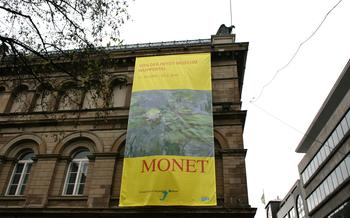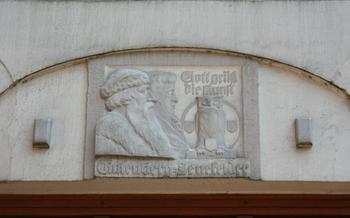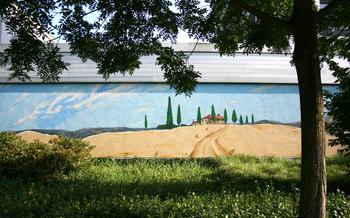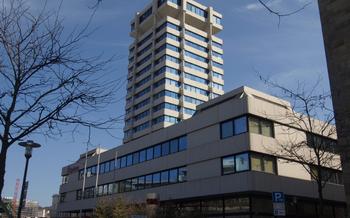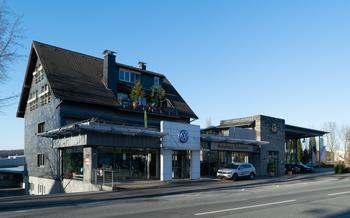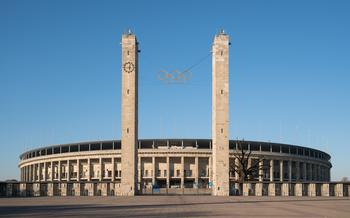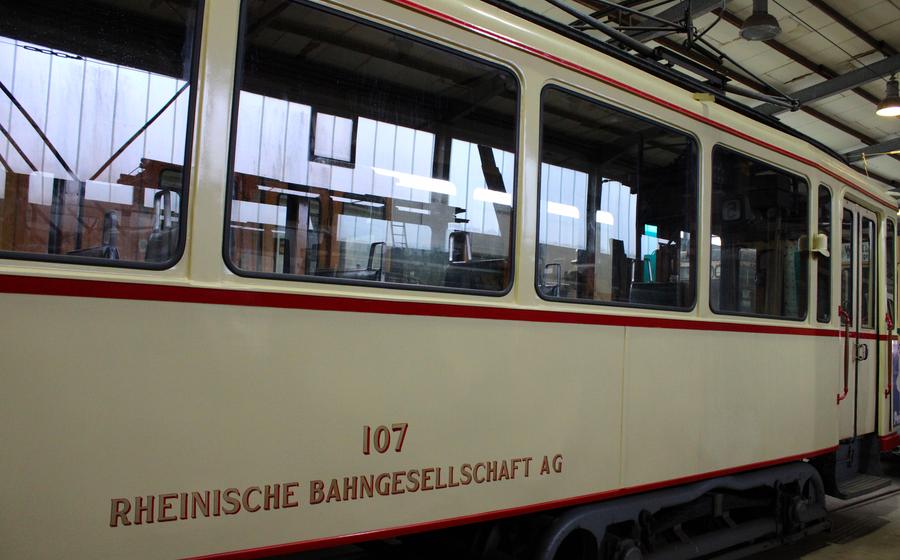
Bergisches Straßenbahnmuseum
- The Bergisches Straßenbahnmuseum: A Unique Experience
- History of the Museum
- The Bergisches Straßenbahnmuseum, a tribute to the history of trams
- Tram Collection
- Interactive Exhibits
- Guided Tours
- Events and Workshops
- Museum Shop
- Accessibility
- Hours of Operation and Admission Fees
- Getting There
- Public Transportation
- Car
- Parking
- Nearby Attractions
- Food and Drink
- Souvenirs
- Photography and Videography
- Insider Tip
The Bergisches Straßenbahnmuseum: A Unique Experience
A hidden gem nestled in the heart of Wuppertal, Germany, the Bergisches Straßenbahnmuseum is a must-visit destination for anyone interested in trams, transportation history, or simply unique and immersive experiences. This one-of-a-kind museum showcases a remarkable collection of historic trams, interactive exhibits, and hands-on activities, providing visitors with an unforgettable journey through the evolution of urban transportation. Situated at Kohlfurther Brücke 115, 42389 Wuppertal, Germany, the museum is easily accessible by public transportation or car and offers a range of amenities to ensure a comfortable and enjoyable visit.
The Bergisches Straßenbahnmuseum is not just a static display of old trams; it's a living, breathing tribute to the rich history of public transportation in Germany. Visitors can step aboard lovingly restored trams, dating from the late 19th century to the present day, and experience firsthand the charm and ingenuity of these iconic vehicles. Interactive exhibits bring the stories of these trams to life, immersing visitors in the social and cultural context of their operation. Whether you're a lifelong tram enthusiast or simply looking for a fun and educational day out, the Bergisches Straßenbahnmuseum promises a memorable and enriching experience.
History of the Museum
The Bergisches Straßenbahnmuseum, a tribute to the history of trams
The Bergisches Straßenbahnmuseum was founded in 1977 by a group of tram enthusiasts who wanted to preserve the history of trams in Wuppertal. The museum is located in a former tram depot that was built in 19The depot was chosen because it was one of the few remaining buildings in Wuppertal that was still used for its original purpose.
The museum's collection includes over 50 trams, dating from the late 1800s to the present day. The trams are all in working condition, and the museum offers visitors the opportunity to ride on some of them. The museum also has a number of interactive exhibits that teach visitors about the history of trams and their role in the development of Wuppertal.
Over the years, the museum has evolved into a major tourist attraction, and it now welcomes visitors from all over the world. The museum is also a popular destination for school groups and other educational groups. The museum's mission is to preserve and promote the history of trams in Wuppertal, and it continues to be a valuable resource for researchers and enthusiasts alike.
Tram Collection
The Bergisches Straßenbahnmuseum boasts an impressive collection of over 100 trams, making it one of the largest and most diverse collections of its kind in Europe. The trams range from horse-drawn vehicles to modern, state-of-the-art models, providing visitors with a comprehensive overview of the history and evolution of tram transportation.
Among the highlights of the collection is the oldest operational tram in the world, a horse-drawn vehicle dating back to 188Visitors can also admire a replica of the world's first electric tram, which was built in 1888 in Berlin. The museum also houses a number of rarities, such as a double-decker tram from Leipzig and a narrow-gauge tram from the Isle of Man.
The variety of trams on display offers visitors the opportunity to learn about the different types of trams that have been used in Germany and around the world over the years. The museum's collection includes trams from both urban and rural areas, as well as trams that were used for special purposes, such as transporting goods or mail.
Interactive Exhibits
The Bergisches Straßenbahnmuseum features a variety of interactive exhibits that help visitors learn about trams and their history in a fun and engaging way. One of the most popular exhibits is a full-size replica of a tram depot, where visitors can see how trams were maintained and repaired. Another popular exhibit is a simulator that allows visitors to experience what it was like to drive a tram.
There are also a number of exhibits that are specifically designed for children. These exhibits include a play area where children can dress up as tram drivers and conductors, and a model train layout that features trams from all over the world.
One of the most unique interactive exhibits at the museum is a virtual reality experience that allows visitors to see what it was like to ride on a tram in the early 1900s. This experience is a great way to learn about the history of trams and to get a feel for what it was like to travel on them.
In addition to the interactive exhibits, the museum also offers guided tours that provide visitors with a more in-depth look at the museum's collection and history. These tours are available in German and English, and they last for about an hour.
Guided Tours
The Bergisches Straßenbahnmuseum offers guided tours in German and English, allowing visitors to delve deeper into the history and significance of the trams on display. These tours are led by knowledgeable and passionate guides who provide insights into the technical aspects, cultural impact, and evolution of trams over the years. The tours typically last for about an hour and cover various topics, including the museum's collection, the history of trams in Wuppertal, and the challenges and triumphs faced by the museum's founders. Visitors can book guided tours in advance to ensure their spot, especially during peak seasons. Whether you're a tram enthusiast, a history buff, or simply curious about the world of public transportation, these guided tours offer a unique and enriching experience.
Events and Workshops
The Bergisches Straßenbahnmuseum offers a variety of events and workshops throughout the year, providing visitors with unique and interactive experiences. These events and workshops are designed to educate and entertain visitors of all ages, and they often focus on different aspects of tram history and technology.
Some of the most popular events include the annual "Tram Parade," which showcases a variety of historic trams from the museum's collection, and the "Tram Night," which offers visitors the chance to ride historic trams after dark. The museum also hosts regular workshops on topics such as tram restoration and model tram building, which are perfect for those who want to learn more about trams and their history.
There are also special events and workshops for children, such as the "Tram Driver for a Day" workshop, which allows children to learn how to drive a real historic tram. The museum also hosts regular family days, which offer a variety of activities for children and adults alike, such as face painting, tram rides, and tram-themed games.
Visitors can find out about upcoming events and workshops on the museum's website or by following the museum on social media.
Museum Shop
The Bergisches Straßenbahnmuseum has a well-stocked gift shop that offers a wide variety of tram-related items, including books, DVDs, postcards, and model trams. There are also a number of unique and exclusive items that can only be purchased at the museum, such as t-shirts, mugs, and other souvenirs featuring the museum's logo. Visitors can also purchase tickets for upcoming events and workshops at the gift shop.
The gift shop is open during the same hours as the museum, and visitors can pay with cash or credit card. The museum also offers an online shop where visitors can purchase items from the comfort of their own homes. The online shop offers a slightly smaller selection of items than the physical gift shop, but it is still a great way to find unique and memorable souvenirs of your visit to the Bergisches Straßenbahnmuseum.
Accessibility
The Bergisches Straßenbahnmuseum is committed to providing a welcoming and accessible environment for all visitors. The museum is fully accessible to people with disabilities, with a variety of features to ensure that everyone can enjoy the exhibits and activities.
Designated parking spaces for visitors with disabilities are available near the museum entrance, and the museum is wheelchair accessible throughout. There are also accessible restrooms and a dedicated elevator to provide easy access to all floors of the museum.
For visitors who are deaf or hard of hearing, the museum offers a variety of assistive listening devices, including FM systems and closed captioning.
The museum staff is also trained to assist visitors with disabilities and can provide additional information or assistance as needed. To ensure the best possible experience, visitors with disabilities are encouraged to contact the museum in advance to discuss their specific needs.
Hours of Operation and Admission Fees
The Bergisches Straßenbahnmuseum is open to the public from Tuesday to Sunday, from 10:00 am to 5:00 pm. It is closed on Mondays. Admission to the museum is €6 for adults, €4 for children, and €5 for seniors and students. Family tickets are also available for €Visitors can purchase tickets online or at the museum's ticket office.
There are a number of ways to save money on admission to the Bergisches Straßenbahnmuseum. For example, visitors can purchase a Jahreskarte, or annual pass, which costs €30 and allows unlimited admission to the museum for one year. Visitors can also save money by visiting the museum on a Tuesday, when admission is only €4 for adults and €2 for children.
The Bergisches Straßenbahnmuseum also offers a number of discounts for groups. For example, groups of 10 or more people can receive a 10% discount on admission. Groups of 20 or more people can receive a 15% discount on admission. To book a group visit, please contact the museum in advance.
Getting There
Getting to the Bergisches Straßenbahnmuseum is easy, whether you are traveling by public transportation or by car.
Public Transportation
The museum is located near the Wuppertal-Oberbarmen train station, which is served by several regional train lines. From the train station, you can take a short walk or catch a bus to the museum.
Car
If you are driving, take the A46 Autobahn to the Wuppertal-Elberfeld exit. From there, follow the signs to the museum. There is a designated parking area for visitors, which is free of charge.
Parking
There is a designated parking area for visitors at the museum, which is free of charge. The parking area is located next to the museum entrance.
Nearby Attractions
The Bergisches Straßenbahnmuseum is situated in a vibrant neighborhood teeming with captivating attractions. A short stroll away, visitors can delve into the intriguing world of art at the Von der Heydt Museum, home to an eclectic collection of paintings, sculptures, and drawings spanning centuries. For those seeking a unique shopping experience, the nearby Elberfelder City Galerie beckons with an array of boutiques, department stores, and specialty shops catering to every taste.
Nature enthusiasts will delight in exploring the picturesque Wuppertal Zoo, where they can encounter a diverse array of animals from around the globe. Alternatively, a leisurely stroll through the idyllic Hardt Park offers a chance to immerse oneself in tranquil natural surroundings and admire the beauty of the blooming flowers.
To delve deeper into the region's rich history, visitors can embark on a journey to the historic Engels House, the birthplace of Friedrich Engels, a renowned philosopher and sociologist. Alternatively, the fascinating Railway Museum invites visitors to trace the evolution of transportation through interactive exhibits and vintage locomotives.
For those seeking a memorable culinary experience, the surrounding area offers a plethora of enticing options. From traditional German fare to exotic international cuisine, there is something to satisfy every palate. Whether it's a cozy café, a bustling bistro, or a fine-dining establishment, visitors are sure to find a culinary adventure that delights their taste buds.
Food and Drink
There are several restaurants and cafes located within walking distance of the Bergisches Straßenbahnmuseum. Visitors can choose from a variety of cuisines, including German, Italian, and Asian. There are also several bakeries and ice cream shops in the area.
Visitors are welcome to bring their own food and drinks into the museum. There are designated picnic areas located on the grounds of the museum, where visitors can enjoy their meals outdoors.
The museum also has a small cafe that sells snacks and drinks. Visitors can purchase sandwiches, salads, pastries, and coffee. The cafe also offers a variety of alcoholic and non-alcoholic beverages.
Souvenirs
Visitors can purchase souvenirs related to the museum or trams at the museum shop. The shop offers a variety of items, including books, postcards, t-shirts, and model trams. There are also some unique and exclusive souvenirs that can only be purchased at the museum, such as limited-edition prints and posters. Visitors can also purchase souvenirs online through the museum's website.
Photography and Videography
Photography and videography are permitted inside the Bergisches Straßenbahnmuseum, allowing visitors to capture their memories and share their experiences with others. Visitors are encouraged to take photos and videos of the exhibits, trams, and interactive displays. However, there are a few restrictions to ensure the safety and preservation of the museum's collection.
Using tripods or other photography equipment is not allowed inside the museum, as they may obstruct the movement of visitors and damage the exhibits. Visitors are also asked to be mindful of other visitors and avoid taking photos or videos that may invade their privacy.
Flash photography is also not permitted, as it can damage the delicate materials used in the exhibits. Visitors are encouraged to use natural light or low-light photography settings to capture the best images. By following these guidelines, visitors can enjoy photography and videography at the Bergisches Straßenbahnmuseum while respecting the museum's collection and the privacy of other visitors.
Insider Tip
One insider tip for visitors to the Bergisches Straßenbahnmuseum is to take advantage of the museum's unique tram rides. For a small additional fee, visitors can ride on a historic tram and experience what it was like to travel on these iconic vehicles in the past. The tram rides are a great way to learn more about the history of trams and to get a unique perspective on the city of Wuppertal.
Another insider tip is to visit the museum on a weekday, if possible. The museum is typically less crowded on weekdays, which makes it easier to see the exhibits and to talk to the museum staff. Visitors can also take advantage of the museum's free guided tours, which are offered on weekdays at 11am and 2pm.
